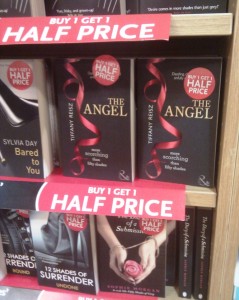…but hopefully not with a paddle. I spotted this in W.H.Smith at Northampton services on the M1 last weekend.

I’d realised my novel’s title is a bit of a hostage to fortune. I like it because it works in conjunction with the content of the novel in several different ways — and I like the definite article usage that’s so associated with pub names. But it obviously has many associations that aren’t lost on the publishers of erotica and similar. Therefore I wasn’t too surprised to see one of the heavily promoted titles in the erotica section in the motorway services used the same title — it’s one of the Mills and Boon Spice series. Interestingly, this is the only The Angel I could find on Amazon, although there are loads of Angel and Angels out there — Marian Keyes used the title and Katie Price has ‘written’ one too. As I’m so familiar with this title, I don’t know what I’d think if an agent or publisher wanted me to change it.
Book titles are a bit like song titles — there aren’t enough original ones to go round. At least mine wouldn’t sit on the same section of the bookshelves — barring a commercially focused rewrite and a foxy sounding pen name. Although the novel doesn’t shy away from the characters’ sexual lives, I think anyone looking for a bit of mass-market sado-masochism will be disappointed. Currently there’s no sex until almost half way through — but, of course, that may yet change.
Speaking of sex scenes in novels, I’ve been ‘enjoying’ excerpts from the Literary Review’s Bad Sex Awards (see previous post). Now the shortlist is out, short 140-character bursts have been tweeted using the hashtag #LRBadSex2012.
I’ve had a few Twitter conversations with whoever tweets as @Lit_Review about some of this year’s incredible bunch of finalists — and they’re from largely well-known writers (one of the authors, Nicola Barker, wrote a set text for last year’s MMU second year MA course).
It’s not the flowery, purply-prose passages that I find particularly funny — sometimes you can see what the writer is trying to aim for — but the ones which are the opposite of lyrical. For example: ‘He ejaculates voluminously and with very great force indeed. In fact, he keeps on ejaculating, there’s loads of the stuff’, ‘he began to massage her with a kind of dry pumping action, which reminded her of someone blowing up a lilo’ or, my favourite, ‘his penis was jerking around wildly in her hand now and she began yelping to encourage his flow of thought’. The Literary Review doesn’t officially identify the authors of the tweets but let’s say my flow of thought is never going to be quite the same again when I’m watching a report on the nation’s stagnant GDP on Newsnight.
As an aside, and nothing to do with bad sex or erotica, I went to the Made In Germany exhibition in Shoreditch on Thursday — a show by six young or emerging German artists. I’d unreservedly recommend anyone else to visit — except that it finished last Friday (another show with different artists is probably planned). I particularly liked the young people nightlife pieces by Nadine Wölk (the only solo female artist) and the odd landscapes by duo Mike MacKeldey & Ellen DeElaine (possibly the same sort of landscapes Kim might paint).

I chatted with the representative from the German gallery who’d organised the show — and told him about my novel. Although I think he’d rather I wanted to buy one of the pictures, he told me a fair amount about how German artists trained and where they tended to live and work (mostly Berlin, as I’d imagined). Kim’s backstory in the novel is fortunately quite plausible — she trained at the Universität der Künste. And it would be quite feasible that she’d come to London, although as the chap from the gallery said he though that Shoreditch High Street was starting to look like Kensington, that she’d find it hard going financially.
On another tangential note, I listened to Dustin Hoffman on Desert Island Discs this morning and the section where he talked about being a young, unknown actor, trying to get parts at auditions was fascinating. His life at that time was all about coping with almost continual rejection.
He still seems to feel the pain in some ways and made a very telling point about how people in the acting industry judge talent. It’s his view that the worst actors often got hired, mentioning that his friend Gene Hackman, also then unknown, was such a good, naturalistic actor that it didn’t look like he was acting when he auditioned — which is what directors at that time wanted to see.
It’s Hoffman’s theory that casting directors are terrified of making a mistake and this leads them into usually preferring someone who’s derivative — who reminds them of a known quantity. Because of this, the original talents are often overlooked.
His story sounds reminiscent of the struggle for recognition of many writers — and how it’s easier to market work that fits a known niche. The photo above of all the Fifty Shades derivatives on the shelves at Northampton services makes the point. Twelve Shades of Submission even re-uses the s word in addition to the ‘number of [insert your kink here]’ formula.
But Dustin Hoffman is a salutary example of persistence. He kept on auditioning, got his break and he’s now received the ultimate honour even in this country — Desert Island Discs.

2 Replies to “Beaten To It?”